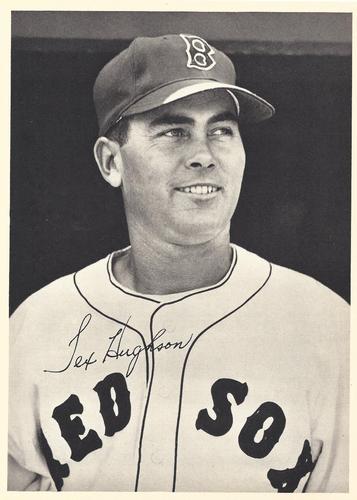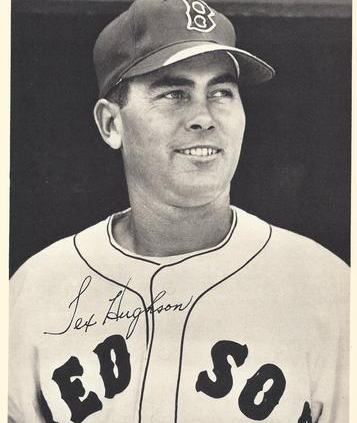May 28, 1949: Tex Hughson holds Nationals after Williams’s solo home run gives Red Sox an edge
 The Boston Red Sox were nearing the end of a homestand in which they won 10 of 13 games, including three extra-inning games and three games in which Ted Williams hit game-winning home runs.1 Williams’s third-inning homer was the game-winner against the Chicago White Sox in the second game of the homestand on May 18. Ten days later, against the Washington Nationals, Williams hit his second game-winner of the homestand, and a longtime member of the Red Sox pitching staff came out of the bullpen for one of the best outings of his final big-league season.
The Boston Red Sox were nearing the end of a homestand in which they won 10 of 13 games, including three extra-inning games and three games in which Ted Williams hit game-winning home runs.1 Williams’s third-inning homer was the game-winner against the Chicago White Sox in the second game of the homestand on May 18. Ten days later, against the Washington Nationals, Williams hit his second game-winner of the homestand, and a longtime member of the Red Sox pitching staff came out of the bullpen for one of the best outings of his final big-league season.
This Saturday afternoon game began with both Boston and Washington 5½ games behind the first-place New York Yankees in the American League standings. The Red Sox were percentage points ahead of the Nationals. Friday’s night’s scheduled series opener had been rained out.
Jack Kramer started for the Red Sox. He had not pitched in 12 days, since going all eight innings in a loss in Washington on May 16. Left fielder Gil Coan led off with a double to right field. Kramer hit right fielder Bud Stewart on the back with a pitch. Coan attempted to steal third but was thrown out by catcher Birdie Tebbetts to Johnny Pesky.
Stewart “unaware of Coan’s intentions [on the steal], remained on first base and such slumbering cost the Nats a run, for [Sherry] Robertson drilled a single to left,” reported the Washington Evening Star.2 Stewart stopped at second on Robertson’s hit. A fly ball to Ted Williams in left and a groundout to second base brought the top of the first to a close. The Washington Post’s Shirley Povich wrote that the Nationals had “performed the feat of accumulating a double, a single and a hit batsman without getting a man past second base.”3
For the Red Sox, Pesky doubled off the left-field wall with one out in the first inning, and Coan crashed into the wall so hard that he had to be removed from the game. A hospital visit showed that no bones had been broken. He had a concussion and was kept overnight.4
Washington manager Joe Kuhel had to make a few defensive changes. Al Kozar went in at second base. Stewart moved from right field to left, and Robertson moved from second to right. Right-hander Ray Scarborough, the author of a complete-game win over the Red Sox on May 14, struck out Williams and retired shortstop Vern Stephens on a popup to strand Pesky.
Washington shortstop Sam Dente hit an infield single in the second and Scarborough walked, but nothing came of it. Second baseman Bobby Doerr’s leadoff single in the bottom of the second was also fruitless.
Stewart singled in the top of the third but was thrown out trying to stretch it to a double. The game went into the bottom of the third still scoreless.
The Red Sox then scored four runs, kicked off by Kramer singling to left field. Dom DiMaggio doubled off the wall in left-center. Pesky shot a ball that “nearly decapitated” Scarborough, per the Boston Globe. It went for a single into center field, and both baserunners scored.5 Williams singled, Pesky going to third base. Stephens singled to left field and Pesky scored.
After five consecutive hits and still no one out, Kuhel brought in a reliever, 21-year-old Dick Welteroth, in his second season with Washington. Welteroth got three outs, the first on Doerr’s comebacker to the mound. Boston’s second out produced the fourth run, as Williams tagged and scored on first baseman Billy Goodman’s fly to center. Right fielder Al Zarilla lined out to left.
In the fourth, the Nats got a single and a base on balls but did not score. Neither did the Red Sox after a leadoff single by Tebbetts and a sacrifice bunt.
Kramer had pitched four scoreless innings, but he was chased in the fifth. Kozar singled to left field to start the inning. One out later, Robertson singled to center and Kozar went first to third. Washington center fielder Clyde Vollmer singled to center, too, scoring Kozar, while Robertson made it to third.
First baseman Eddie Robinson flied to Williams in left, and Robertson tagged and scored – safe “by an eye-lash,” noted the Boston Herald.6 Williams’s throw to Tebbetts had been very close. Kramer then walked third baseman Eddie Yost and Dente.
Catcher Al Evans singled to left, driving in Vollmer and Yost. The game was tried, 4-4. Manager Joe McCarthy made a move. Kramer was taken out. Tex Hughson was brought in.
Hughson had been with Boston since his rookie season of 1941. He led the majors with 22 wins in 1942 and won 20 games and pitched a staff-high 278 innings for the Red Sox 1946 pennant-winners. After the 1947 season, however, Hughson had orthopedic surgery to address ongoing numbness in his right shoulder.
He was never again the dominant pitcher he had been. He hadn’t worked that much in 1948 – only 19⅓ innings – and only in relief. He’d had a couple of starts in April and May 1949, but mostly pitched out the bullpen. Here, he preserved the tie by retiring Welteroth on a grounder back to the mound.
In the bottom of the fifth, the first batter for Boston was Ted Williams. He swung at Welteroth’s first pitch and, as the Boston Herald reported, hit “a high drive which dropped into the bullpen reserved for visiting firemen.”7 In other words, he homered into the Washington bullpen in right field. The tie was broken on Williams’s 10th homer of the season.
The inning wasn’t over yet, but the scoring was. Stephens singled and Doerr drew a walk. The next two batters flied out to left field, but Boston loaded the bases when Tebbetts singled. Hughson had the opportunity to add insurance runs, but he made the third out, taking a third strike.
Hughson cruised through the next three innings, allowing only Stewart’s harmless two-out single in the sixth. His effective work was necessary, as Williams’s tiebreaking homer was the only blemish against Washington’s bullpen. Welteroth held the Red Sox to just one run in five innings, and Joe Haynes added a scoreless eighth.
The score remained 5-4 heading into the ninth. Hughson had held up, but he flirted with danger. With one out, Robertson doubled down the right-field line off the fence in front of the grandstand, his third hit of the game. Vollmer hit a ball that dropped in among three fielders, and he made a double out of it, but Robertson was uncertain whether or not Zarilla would catch it and had to hold at third base.
Robinson walked, loading the bases with just one out. A deep fly ball would have tied the game, but Hughson struck out Yost on four pitches. The final out came when Dente grounded to Goodman, and Hughson took the throw at first.
The 1949 season was Hughson’s last in baseball. He remained in the bullpen after this game, finishing with a career-worst 5.33 ERA in 29 appearances.8 His scoreless 4⅔ innings against the Nationals, allowing only three hits and walking one, were a season highlight.
A 10-4 loss to Washington on May 29 left the Red Sox with a split of the abbreviated series. Williams hit his 11th homer of the season in that game. A day later, in the second game of a doubleheader against the Philadelphia Athletics, Williams connected on his third game-winner of the homestand.
Acknowledgments
This article was fact-checked by Thomas J. Brown Jr. and copy-edited by Len Levin.
Sources
In addition to the sources cited in the Notes, the author consulted Baseball-Reference.com and Retrosheet.org.
https://www.baseball-reference.com/boxes/BOS/BOS194905280.shtml
https://www.retrosheet.org/boxesetc/1949/B05280BOS1949.htm
Photo credit: Tex Hughson, Trading Card Database.
Notes
1 A “game-winning home run” is defined here as a home run that provides a game’s final margin of victory, giving the winning team at least one more run than the opposing team scored. For example, if a two-run homer increased a team’s lead from 2-1 to 4-1, and it went on to win 4-3, it qualifies as a game-winning home run. (This is different from the definition of “game-winning RBI” in baseball’s official statistics from 1980 through 1988, which counted as “game-winning” the RBI that provided a winning team the lead that it never relinquished.)
2 Burton Hawkins, “Red Sox Nose Out Nats, 5-4, as Williams Homers,” Washington Evening Star, May 29, 1949: B1, B2.
3 Shirley Povich, “Bosox Halt Griffs with Bases Full,” Washington Post, May 29, 1949: C1.
4 Jack Barry, “Sox Climb to 2d Place; Braves Regain N.L. Top,” Boston Globe, May 29, 1949: 1, 14.
5 Barry.
6 Arthur Sampson, “Sox, Braves Win on Homers,” Boston Herald, May 29, 1949: 13, 14.
7 Sampson.
8 For a contemporaneous look at Hughson’s situation, see Will Cloney, “Tex Again Craving for Starting Role,” Boston Herald, May 29, 1949: 13, 14. Surprisingly, Hughson twice entered game in the first inning (June 14 and July 29) that season and pitched a full nine innings both times. Note to author from Thomas J. Brown Jr., April 11, 2024.
Additional Stats
Boston Red Sox 5
Washington Nationals 4
Fenway Park
Boston, MA
Box Score + PBP:
Corrections? Additions?
If you can help us improve this game story, contact us.


